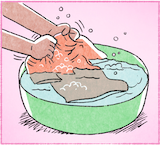
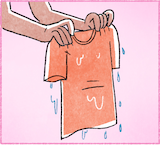
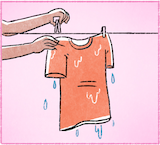
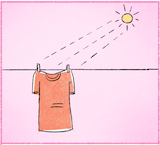
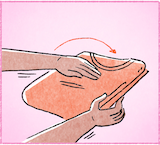
เขากำลังเฮ็ดหญัง เขากำลังซักผ้า เขาซักผ้าโตสีแดง เขาซักผ้าโตหนึ่ง
ซักผ้าอยู่ในกะละมัง กะละมังเป็นวงกม กะละมังใบบักใหญ่หนึ่งดอก กะละมังใบสีเขียว กะละมังอันบักใหญ่
เสี้ยโตนี้มันอาดสิสกกะปก หลือบ่สะอาด หลือบ่เป็นตาใส่ หลือเหม็นนั้นหละ เขากะเลยสิซักให้มันสะอาดกะได้
เขาซักผ้าอยู่ใส จักคือกัน ฮู้แต่ว่าเขาซักผ้าอยู่ในกะละมัง กะละมังใบวงกม กะละมังใบบักใหญ่หนึ่ง ใบสีเขียว
เขาใซ้มือของเขาสองข้างนั้นหละ ซักเสี้ยโตนี้ ใซ้มือสองข้างของเขาซักเสี้ยโตนี้ให้มันสะอาด หลือให้มันดูดีขึ้น หลือให้มันเป็นตาเบิ่งนั้นหละ
2
เขากำลังเฮ็ดหญัง เขากำลังซิดผ้า หลือสะหลิดผ้านั้นหละ เพื่อที่สิให้มันหมาดๆ เพื่อที่สิให้เสี้ยโตนี้มันหมาด หลือบ่ให้มีน้ำติดอยู่ในเสี้ยโตนี้
เสี้ยโตนี้มันเปียกแม่นบ่ แม่น เสี้ยโตนี้มันเปียก เพาะว่าหัวกะซักมา เพาะว่าหัวกะซักมาจากน้ำ มันกะเลยเปียก เสี้ยโตนี้มันเปียกอยู่
คือฮู้ว่าเสี้ยโตนี้มันเปียก กะฮู้ เพาะว่าน้ำมันไหลออกมาจากเสี้ยโตนี้ ในเสี้ยโตนี้มันเปียกอยู่ มันมีน้ำพ้อม กะเลยฮู้ว่ามันเปียกอยู่
ตอนนี้เขาถือเสี้ยอยู่แม่นบ่ แม่น เขาถือเสี้ยอยู่ เขาจับเสี้ยอยู่ เขาใซ้มือของเขาสองข้างจับเสี้ยอยู่ คือสิสะหลิดเสี้ยอยู่ เพื่อที่สิให้น้ำมันออกจากเสี้ยโตนี้หละ
ต่อจากนี้แล้วเขาสิเฮ็ดอี่หยังต่อ เขากะอาดสิเอาไปตาก หลือเอาไปตากอยู่ฮาวตากผ้ากะได้
3
เขากำลังเฮ็ดหญัง เขากำลังสิตากผ้า เขากำลังสิเอาเสี้ยโตนี้หละไปตากอยู่ในฮาว หลือตากใส่แดด เพื่อที่สิให้เสี้ยโตนี้มันแห้ง
เขาตากเสี้ยโตนี้จั่งใด เขาตากอยู่ฮาว อยู่ฮาวตากผ้านั้นหละ เป็นฮาวเซียก หลือฮาวอี่หยังบุ อาดสิเป็นฮาวเหล็กกะได้
เขาใซ้มีแนวหนีบสองอัน ใซ้แนวหนีบสองอันนั้นหละ หนีบเสี้ยโตนี้ หนีบฝั่งซ้ายกับฝั่งขวา เพื่อที่สิให้มันอยู่ เพื่อที่สิให้มันติดกับฮาวอันนี้ แล้วกะตากแดดต่อไป
เป็นหญังเขาคือตากอยู่ฮาว เพาะว่าสิให้เสี้ยโตนี้มันถืกแดด แล้วให้มันแห้งเล็วขึ้น เพื่อที่สิสามาดใซ้ได้ หลือให้มันแห้งแล้วกะเอาไปใส่
4
ตอนนี้เป็นอี่หยังอยู่ เสี้ยโตนี้กำลังตากอยู่ ตากอยู่ฮาวเก่านั้นหละ ตากอยู่ในฮาว
เสี้ยโตนี้เสี้ยแขนสั้น เสี้ยสีแดง ตากอยู่โตเดียว ตากอยู่ฮาวกางเดิ่นกางลานอี่หยังกะบ่ฮู้
แล้วเสี้ยโตนี้มันกะถืกแดดพ้อม แดดกะส่องมาใส่เสี้ยโตนี้ แล้วกะเฮ็ดให้เสี้ยโตนี้แห้ง แล้วกะบ่ให้เสี้ยโตนี้เปียกคือเก่า แล้วน้ำมันกะสิละเหยขึ้น เพาะว่ามันมีแดด แดดมันส่อง แล้วเฮ็ดให้เสี้ยโตนี้มันแห้ง
เสี้ยโตนี้ใซ้เวลาโดนบ่มันจั่งสิแห้ง กะใซ้เวลาโดนอยู่ ขั้นแดดมันฮ้อนคัก มันกะสิใซ้เวลาบ่โดน
ขั้นมันบ่มีแดด หลือแดดมันบ่ค่อยฮ้อน มันกะใซ้งานโดน หลือใซ้เวลาโดน กว่าเสี้ยโตนี้มันสิแห้ง
5
เขากำลังเฮ็ดหญัง เขากำลังพับผ้า เอาผ้าที่ตากนั้นหละเอามาพับ เพื่อที่สิเก็บให้มันเลียบล้อย เพื่อที่สิให้มันเป็นละเบียบเลียบล้อย
เป็นหญังเขาคือพับผ้า กะจักคือกัน เขาอาดสิให้มันดูดีขึ้น หลือเป็นละเบียบเลียบล้อยนั้นหละ เขากะเลยพับผ้า
เอาผ้าที่ตากนั้นหละ เอามาพับ เพื่อที่สิให้มันเป็นละเบียบขึ้นกว่าเก่า หลือให้มันเป็นตาเบิ่งกว่าเก่า
พอพับผ้าแล้วสิเอาไปเก็บอยู่ใส สิเอาเสี้ยโตนี้ไปเก็บใส กะเอาเสี้ยโตนี้ไปเก็บในตู้ ขั้นพับแล้วกะเอาไปเก็บไว้ในตู้ หลือซั้นเก็บเสี้ยผ้า เพื่อที่สิให้มันเป็นละเบียบ
ขั้นมีเสี้ยหลายๆ โต แล้วไปพับวางกัน วางถ้อนกัน วางซ้อนกันอยู่ในตู้ แล้วมันสิเป็นตาเบิ่งบ่ กะเป็นตาเบิ่งอยู่ ขั้นมีเสี้ยหลายๆ โตพับ แล้วกะวางซ้อนกันหลายๆ โต มันกะสิเป็นตาเบิ่ง เป็นละเบียบเลียบล้อย
Link to overview page
Link to dictionary
| Isaan | Pronunciation | Tones | Thai | English/Notes |
|---|---|---|---|---|
| เขา | khao | M | เขา | personal pronoun: he, she |
| กำลัง | gam-laŋ | M-HR | กำลัง | auxiliary indicating continuous or progressive action |
| เฮ็ด | het | H | ทำ | to do, to make |
| หญัง | ɲaŋ | M | อะไร, เป็นหญัง = ทำไม | 1. what {เขากำลังเฮ็ดหญัง = What is he doing?} {ธูปเอาไว้เฮ็ดหญัง = What are incense sticks for?} 2. something, anything, (nothing) 3. เป็นหญัง[...]คือ in initial position: why {เป็นหญังเขาคือใส่บักพิกลงไปในกวยเตียว = Why is he putting chili in [his] noodle soup?} {เป็นหญังหน้าต่างมันคือเปิด = Why is the window open?} {เป็นหญังมันคือมีควนไฟ = Why is there smoke?} |
| ซัก | sak | H | ซัก | to wash {ซักผ้า = to do the laundry} |
| ผ้า | pha: | LF | ผ้า | 1. clothes 2. cloth |
| โต | to: | M | ตัว | 1. body, self 2. clf. for animals, characters/letters/consonants, appliances, clothes (e.g., pairs of trousers, shirts) |
| สี | si: | M | สี | 1. color 2. colored pencil, crayon |
| แดง | dɛ:ŋ | M | แดง | red |
| หนึ่ง | nʉŋ | H | หนึ่ง | 1. one 2. after adjective: intensifier {บักคักหนึ่ง = very much} {อันบักใหญ่หนึ่ง = very large}, or attenuates the meaning {กะดาดมันแผ่นน้อยๆ หนึ่ง = the piece of paper is [relatively] small} |
| อยู่ | yu: | H | อยู่ | 1. to be (located) at 2. yet, still 3. auxiliary indicating continuous or progressive action {ทอดปาอยู่ในกะทะ = (in the process of) frying a fish in the pan} {แม่กำลังเมี้ยนเฮียนอยู่ = mother is cleaning/tidying up the house} |
| ใน | nai | HR | ใน | in, within |
| กะละมัง | ga-la-maŋ | M-H-HR | กะละมัง | bowl, basin |
| เป็น | pen | M | เป็น | 1. to be, to exist 2. to be able to 3. to suffer, sth. happens to 4. เป็นหญัง[...]คือ in initial position: why? {เป็นหญังเขากะคือแปงฟัน = Why is he brushing his teeth?} {เป็นหญังเคี่ยงบินมันคือสิตก = Why is the airplane falling down?} |
| วงกม | woŋ-gom | HR-M | วงกลม | 1. circle, ring, sphere 2. round |
| ใบ | bai | M | ใบ | 1. leaf {ต้นไม้มีใบสีเขียว = the tree has green leaves} 2. banknote {เทิงมีใบพ้อม เทิงมีเหลียนพ้อม = there are notes as well as coins} 3. clf. for leaves, bank notes, helmets, bowls, jars, pots, boxes {ใบบัว = lotus leaf} {ก่องใบน้อย = a small box} {หม้อใบนี้มีฝาพ้อม = the pot here has a lid, too} {ถ้วยใบสีแดง = a red bowl} |
| บัก | bak | M | 1. intensifier before adjectives {ปาโตบักใหญ่ = a (very) large fish} 2. prefix in front of fruits and vegetables {บักแตงโม = watermelon} 3. can be used as a reference for a male person of the same or younger age {บักอันนี้ = this lad} |
|
| ใหญ่ | ɲai | H | ใหญ่ | large, big |
| ดอก | dɔ:k | LF | หรอก, ดอก | 1. particle used after a negative, relativizing or explanatory statement to make the sense milder {กินเข้าบ่ บ่กินดอก = Are you going to eat [with us]? No.} {เป็นก้อนสี่เหลี่ยม ก้อนน้อยๆ ดอก = These are cubes, small cubes.} {แล้วกะมีลดคันหนึ่งขี่ผ่านมา เป็นลดเก็งดอก = And there's a car passing, a sedan.} 2. particle used to emphasize (not necessarily a negative) contrast 3. particle used for emphasis {ดอกไม้นี้งามบ่ กะงามอยู่ เบิ่งงามๆ ดอก = Is this flower beautiful? Yes, it's beautiful, it looks beautiful} |
| เขียว | khi:ao | M | เขียว | green |
| อัน | an | M | อัน | 1. thing, object 2. general clf. for objects |
| เสี้ย | si:a | LF | เสื้อ | shirt |
| นี้ | ni: | HF | นี้ | 1. this 2. here |
| มัน | man | HR | มัน | it (also used to refer to people) |
| อาด | a:t | LF | อาจ | 1. might, may, will 2. likely |
| สิ | si | M | จะ | future tense auxiliary {เขากำลังสิตื่น = he's about to wake up} {สิไปตะหลาด = [I'm] going to the market} |
| สกกะปก | sok-ga-pok | M-M-M | สกปรก | dirty |
| หลือ | lʉ: | M | หรือ | or |
| บ่ | bɔ: | H | ไม่ | 1. no, not 2. question particle, transforming a statement into a question Notes: spelling exception in line with common usage on social media |
| สะอาด | sa-a:t | M-LF | สะอาด | clean |
| ตา | ta: | M | ตา | as a prefix: likely, worthy, fit for (like Thai น่า-) {ตาฮัก = lovely/cute} {ตาสะออน = praiseworthy} {ตาหวาน = (of ice cream) [likely to be] sweet} {ตาอยู่ = to be a good place to be} Notes: see also various entries for ตา-, e.g., ตาแซบ, ตาพู่ฮ้าย, ตาย้าน, ตาอยากหัว, ตาฮัก, ตามีแฮง |
| ใส่ | sai | H | ใส่ | 1. to put something in/on {เขาใส่บักพิกในกวยเตียวหลาย = he's putting a lot of chili in his noodle soup} {เขาบีบยาสีฟันใส่แปงสีฟัน = he squeezes toothpaste on the toothbrush} {ก่องเอาไว้ใส่ของ = boxes are there to put stuff in} 2. to wear (clothes) {เขาใส่เสี้ยแขนญาว = he's wearing a long-sleeve} 3. directed at {เอิ้นใส่กัน = to call each other/to say to each other} {หมามันเห่าใส่แมว = the dog barks at the cat} {ล้องเพงใส่ไม = to sing into the microphone} {เขากำลังซี้มือไปใส่พุซาย = she's pointing at the man} |
| เหม็น | men | M | เหม็น | to smell, to stink |
| นั้นหละ | nan-la | HF-M | นั่นแหละ | auxiliary for emphasis at the end of a phrase |
| กะ | ga | M | ก็ | 1. then, consequently 2. also |
| เลย | lə:i | HR | เลย | 1. futher on, beyond, past {เข็มน้อยเลยเลขสิบสองไป = the minute hand has passed number twelve} 2. too much 3. at all 4. definitively 5. completely, utterly |
| ให้ | hai | LF | ให้ | 1. to give {หมอกำลังเอายาให้คนป่วยกิน = the doctor is giving the patient medicine} 2. for 3. to allow, to be allowed |
| ได้ | dai | HF | ได้ | 1. can 2. to get, to obtain 3. before verb: indicating past tense 4. บ่ได้ + verb: not |
| ใส | sai | M | (ที่)ไหน | 1. where? {สิไปใส = Where are [you] going?} {มาแต่ใส = Where are [you] coming from?} {กะทะอยู่ใส = Where's the pan?} 2. somewhere, anywhere {ใสกะได้ = anywhere, wherever you like} |
| จัก | jak | M | จัก | 1. answer to a question: [I] don't know, don't know exactly, [I'm] not sure {พุซายคนนี้เขาเถ้าไป่ จัก จักเถ้าหลือบ่เถ้า เบิ่งบ่ค่อยออก = Is this man here already old? I don't know. I can't see clearly whether he's old or not.} {เขาเว้ากันอยู่ใส จักคือกัน = Where are they talking? I don't know either.} 2. exact(ly), what exactly {จักต้มอี่หยังกะบ่ฮู้ = I don't know what (exactly) he is cooking} {บ่ลู้คือกันจักปาอี่หยัง = I don't know either what kind of fish this is} 3. how much/many? {ต้นไม้มีจักต้น = How many trees are there?} {ตอนนี้จักโมงแล้ว = What time is it now?} {มือของเฮานี้สิมีจักนิ้ว = How many fingers do our hands have?} 4. a bit, a little bit {จักหน่อย/จักหน่อยหนึ่ง = a bit, a little bit} |
| คือกัน | khʉ:-gan | HR-M | เหมือนกัน | 1. also, likewise, similarly {ยินดีที่ได้ฮู้จักคือกันคับ = Nice to meet you too!} 2. in negative sentences: either {บ่ลู้คือกัน = I don't know either} {จักคือกัน = I don't know (either)} |
| ฮู้ | hu: | HF | รู้ | 1. to know 2. to understand Notes: equivalent to ลู้ |
| แต่ว่า | tɛ:-wa: | H-H | แต่ว่า | 1. but 2. only {ฮู้แต่ว่าเขายืนอยู่พุเดียว = I only know that he's standing there by himself} |
| ใซ้ | sai | HF | ใช้ | to use |
| มือ | mʉ: | HR | มือ | 1. hand 2. front leg/paw (e.g., of a cat) |
| ของ | khɔ:ŋ | M | ของ | of, belonging to |
| สอง | sɔ:ŋ | M | สอง | two |
| ข้าง | kha:ŋ | LF | ข้าง | 1. side {มีหูจับสองข้าง = there are handles on both sides} 2. next to {วางอยู่ข้างๆ ก่องใบใหญ่ = it's placed next to the large box} {เขายืนอยู่ข้างๆ อีกพุหนึ่ง = he's standing next to another person} 3. clf. for body parts which come in pairs (eyes, ears, legs etc.) {เขามีตาสองข้าง = she has two eyes} |
| ดู | du: | M | ดู | to look |
| ดี | di: | M | ดี | good |
| ขึ้น | khʉn | LF | ขึ้น | 1. to go up, to increase 2. sun: to rise {ตะเว็นกำลังขึ้น = the sun is rising} 3. more 4. bus/train etc.: to get on, to board {พุโดยสานขึ้นลดไฟเบิดแล้ว = all passengers have boarded the train} |
| ตาเบิ่ง | ta:-bəŋ | M-H | น่าดู | attractive, worth looking at, worth seeing |
| ซิด | sit | H | ซิด | to shake off, to shake out |
| สะหลิด | sa-lid | M-M | สลัด | to shake off |
| เพื่อที่ | phʉ:a-thi: | H-H | เพื่อที่ | in order to, so that Notes: the vowel เอือ is likely to be a Thai loan |
| หมาด | ma:t | LF | หมาด | half dry, almost dry |
| มี | mi: | HR | มี | 1. to have 2. there is |
| น้ำ | na:m | HF | น้ำ | 1. water 2. drink, soft drink, juice |
| ติด | tit | M | ติด | 1. to be attached to, to be on/at {สะวิดเปิดไฟติดอยู่ข้างฝาบ้าน = the light switch is on the wall} {มันสิมีน้ำติดอยู่โตของเขา = there is water on his body} 2. to stick (to), to attach (to) |
| เปียก | pi:ak | LF | เปียก | wet |
| แม่นบ่ | mɛ:n-bɔ: | H-H | ใช่ไหม | question particle: ..., right? ..., isn't it? ..., don't you? etc. {เจ้าได้เห็นสิ่งนั้นแม่นบ่ = You've seen that, haven't you?} {ฝนกำลังตกแม่นบ่ = It's raining, isn't it?} {นี้คือกะคุแม่นบ่ = This is a bucket, isn't it?} |
| แม่น | mɛ:n | H | ใช่ | 1. yes 2. affirmative particle |
| เพาะว่า | phɔ-wa: | H-H | เพราะว่า | because |
| หัว | hu:a | M | เพิ่ง | just, just now, only just {คนที่หัวกะเคยพ้อกัน = someone [we've] just met} {หัวกะตื่น = [I've] just woken up} {หัวกะซักมา = [the shirt has] just [been] washed} |
| มา | ma: | HR | มา | 1. to come 2. auxiliary expressing action towards the present or focal time {กะคุเฮ็ดมาจากอี่หยัง = What is the bucket made of?} {แล้วเขากะเก็บเงินจากพุนั้นมา = and then she takes the money of that person} |
| จาก | ja:k | LF | จาก | 1. from {... เฮ็ดมาจากอี่หยัง = ... is made from what?} 2. to depart |
| คือ | khʉ: | HR | คือ | 1. to be, to resemble, like, as 2. why {บักหล้าคือบ่เก็บโต่ะแน่ = [addressing a young boy] Why haven't you cleared the table?} |
| ว่า | wa: | H | ว่า | 1. that, as {คำว่า X = the word X} 2. to say |
| ไหล | lai | M | ไหล | to flow |
| ออก | ɔ:k | LF | ออก | 1. to go out, to leave 2. out |
| พ้อม | phɔ:m | HF | พร้อม | at the same time, also, too {มีตะเว็นพ้อม = the sun's out, too} {กะทะมีด้ามพ้อม = the pan has also a handle} |
| ตอนนี้ | tɔ:n-ni: | M-HF | ตอนนี้ | now |
| ถือ | thʉ: | M | ถือ | 1. to hold 2. to carry 3. to regard as, to consider {สี่สิบองสาถือว่าฮ้อน = 40 degrees Celsius is considered hot} |
| จับ | jap | M | จับ | 1. to grasp, to hold {เขาจับมือกัน = they're holding hands} {เขายืนจับไอติมอยู่ = she's standing, holding an ice cream} 2. to catch, to arrest {จับพุล้าย = to arrest a criminal} |
| นี้หละ | ni:-la | HF-M | นี่แหละ | auxiliary for emphasis at the end of a phrase |
| ต่อ | tɔ: | H | ต่อ | 1. next 2. to join, to connect, to link Notes: see also ต่อไป, ต่อไปนี้ |
| แล้ว | lɛ:o | HF | แล้ว | 1. finished 2. already 3. and then, and next (especially แล้วกะ) 4. auxiliary for past tense |
| อี่หยัง | i:-yaŋ | H-M | อะไร | 1. what {นี้คืออี่หยัง = What is this?} {มื้อนี้เจ้าเฮ็ดอี่หยัง = What are you doing today?} {กินเข้างายกับอี่หยัง = What did you have for breakfast?} 2. something, anything, (in negations) nothing {บ่ต้องเฮ็ดอี่หยังอีกเลยนอกจากใส่ปุย = [we] don't need to do anything besides adding fertilizer} |
| เอา | ao | M | เอา | to take, to give {เขากำลังเอาก่องไปซั่ง = he's taking the boxes to weigh them} {หมอกำลังเอายาให้คนป่วยกิน = the doctor is giving medicine to the patient} {เอาไว้ถ้า = is for, is used for, has the purpose of} |
| ไป | pai | M | ไป | 1. to go 2. auxiliary indicating action extending into the future |
| ตาก | ta:k | LF | ตาก | to dry in the sun, to expose to the sun |
| ฮาว | ha:o | HR | ราว | clothes line, clothes rack {ฮาวตากผ้า = clothes line, clothes rack} |
| แดด | dɛ:t | LF | แดด | sunlight |
| แห้ง | hɛ:ŋ | LF | แห้ง | dry |
| จั่งใด | jaŋ-dai | H-M | ยังไง, แบบไหน | how, in what manner {บักนาวมันมีลดซาดจั่งใด = Lime fruits have what kind of taste?} {เขาปิดแอจั่งใด = How is he switching off the A/C?} {เทียนใซ้จั่งใด = How's a candle used?} {สิใซ้จั่งใด = how is [it] used?} |
| เซียก | si:ak | HF | เชือก | 1. rope, string 2. shoelace |
| บุ | bu | M | particle: used to convey a sense of uncertainty, or to ask oneself {ตั้งอยู่เทิงโต่ะ หลือตั้งอยู่ใสบุ = [placed] on the table, or somewhere else} {คือใดบุ = who knows?, maybe} | |
| เหล็ก | lek | M | เหล็ก | iron, steel, metal |
| แนวหนีบ | nɛ:o-ni:p | HR-LF | ที่หนีบผ้า, ไม้หนีบผ้า | clothes peg |
| หนีบ | ni:p | LF | หนีบ | to pinch |
| ฝั่ง | faŋ | H | ฝั่ง | 1. side 2. river/canal bank, shore |
| ซ้าย | sa:i | HF | ซ้าย | left |
| กับ | gap | M | กับ | 1. and {ลุงกับป้า = uncle and aunt} {กวยเตียวหมูกับกวยเตียวไก่ = noodle soup with pork and noodle soup with chicken} 2. with, to {ค้ายๆ กับคำว่า ... = similar to the word ...} 3. prefix in front of foods {กับเข้า = side dishes eaten with rice} {เขากินกับกวยเตียว = he's eating noodle soup} |
| ขวา | khwa: | M | ขวา | right |
| ต่อไป | tɔ:-pai | H-M | ต่อไป | next |
| ถืก | thʉ:k | LF | ถูก | marker for passive {ขั้นมันถืกความฮ้อนมันกะละลาย = when it is exposed to heat, it melts} {เฮ็ดในสิ่งที่บ่ดี เขากะเลยต้องถืกจับ = [he's] done something bad, so he gets arrested} {กะดาดมันกำลังถืกไฟไหม้ = the paper is burning} |
| เล็ว | leo | HR | เร็ว | fast, quick |
| สามาด | sa:-ma:t | M-HF | สามารถ | can, to be able |
| เก่า | gao | H | เก่า | old |
| แขน | khɛ:n | M | แขน | arm |
| สั้น | san | LF | สั้น | short |
| เดียว | di:ao | M | เดียว | only, alone, single |
| กาง | ga:ŋ | M | กลาง | middle, center |
| เดิ่น | də:n | H | ลาน | yard, lawn, grounds |
| ลาน | la:n | HR | ลาน | yard, lawn, grounds |
| ส่อง | sɔŋ | H | ส่อง | 1. to look 2. to shine {แดดมันส่อง แล้วเฮ็ดให้เสี้ยโตนี้มันแห้ง = the sun is shining and drying the shirt} |
| คือเก่า | khʉ:-gao | HR-H | as before | |
| ละเหย | la-hə:i | H-M | ระเหย | to evaporate |
| เวลา | we:-la: | HR-HR | เวลา | time, period |
| โดน | do:n | M | นาน | time: long |
| จั่ง | jaŋ | H | ค่อย (?) | then, afterwards {ต้องใซ้น้ำมันพ้อม มันจั่งสิทอดได้ = one needs to use oil as well, then one can fry [food]} |
| ขั้น | khan | LF | เมื่อ | when, if |
| ฮ้อน | hɔ:n | HF | ร้อน | hot |
| คัก | khak | H | intensifier: very, very much | |
| บ่ค่อย | bɔ:-khɔ:i | H-H | ไม่ค่อย | not so (much) {เบิ่งบ่ค่อยออก = I can't really see it clearly} |
| ใซ้งาน | sai-ŋa:n | HF-HR | ใช้งาน | to use, to put to use |
| กว่า | gwa: | H | กว่า | more, more than, comparative: as, than |
| พับ | phap | H | พับ | to fold |
| ที่ | thi: | H | ที่ | 1. that, which {คนที่ยืนอยู่ฝั่งขวา = the person which is standing on the right = the person standing on the right} {เว้าคำที่บ่สุพาบ = to speak words which are impolite = to speak impolitely} 2. for ordinal numbers {ที่สาม = third} |
| เก็บ | gep | M | เก็บ | 1. to collect, to gather, to accumulate, to pick/harvest {เก็บเงิน = to save money} {in a restaurant: เก็บเงิน = to get the bill} {เก็บน้ำ = to collect and store water} {เก็บผัก = to harvest vegetables} 2. to keep 3. to take in, to put away, to tidy up |
| เลียบล้อย | li:ap-lɔ:i | HF-HF | เรียบร้อย | neat, tidy, refined, well-behaved, in good order |
| ละเบียบ | la-bi:ap | H-LF | ระเบียบ | 1. order, system, proper arrangement 2. orderly, tidy, neat |
| พอ | phɔ: | HR | พอ | 1. just when, just after, as soon as 2. enough, adequate |
| ตู้ | tu: | HF | ตู้ | 1. cupboard, cabinet 2. clf. for cupboards, cabinets, ATMs {ตู้เอทีเอ็ม = ATM} {เป็นตู้ไว้ถ้ากดเงิน = it's an [ATM/machine] for withdrawing money} {ตู้เสี้ยผ้า = wardrobe} |
| ไว้ | wai | HF | ไว้ | 1. to keep, to put, to place, to retain, to save, to reserve {เขาเอาหัวของเขาไว้ใส = Where does she put her head?} {หมาสิเลี้ยงไว้บ้าน = dogs are kept/raised in the house} {ไก่เลี้ยงไว้ในคอก = chicken are kept/raised in a coop} {หน้ามันบังไว้ = the face is covered/not visible} {เขาเอาโทละสับวางไว้หู = he holds the phone to his ear} 2. for {นาลิกาปุกมีไว้เฮ็ดหญัง = What is an alarm clock for?} {หม้อเอาไว้เฮ็ดแนวกิน = a pot is used to make food} {ก่องเอาไว้เฮ็ดหญัง ก่องเอาไว้ใส่ของ = What is the box for? It's for putting in stuff.} Notes: see also ไว้ถ้า |
| ซั้น | san | HF | ชั้น | 1. floor, shelf, step of a staircase {ซั้นเก็บเสี้ยผ้า = clothes shelf} {ซั้นวางหนังสือ = book shelf} 2. level, grade, class {ซั้นมอสี่ = secondary school grade four} 3. layer |
| เสี้ยผ้า | si:a-pha: | LF-LF | เสื้อผ้า | clothes, clothing |
| หลาย | la:i | M | เยอะ, มาก | many, much, very |
| วาง | wa:ŋ | HR | วาง | to place, to set/put down {โทละสับ/phone: วางสาย = to hang up} {มีเกิบวางอยู่ในก่อง = there are shoes in the box} {มือข้างหนึ่งเขาวางอยู่เทิงโต่ะ = he's put one of his hands on the table} |
| กัน | gan | M | กัน | mutual, each other, with another, together {เขากำลังนั่งเว้ากัน = they're sitting and talking} {เขาสองคนฮักกัน = they love each other} {ปาสองโตนี้ ใหญ่ห่างกันหลายบ่ = These two fish here, are they very different in size (from each other)?} {ต่างกัน = to be different (from each other)} {ก่องอันไหนหนักกว่ากัน = Which box is heavier (than the other(s))?} |
| ถ้อน | thɔ:n | LF | ถ้อน | to gather together, to accumulate, to collect |
| ซ้อน | sɔ:n | HF | ซ้อน | to pile up, to put on, to lay on top of, to stack {เอาถ้วยวางซ้อนกัน = to pile up/stack bowls} {พุซ้อน = passenger, e.g., of a motorbike or tuk tuk} |